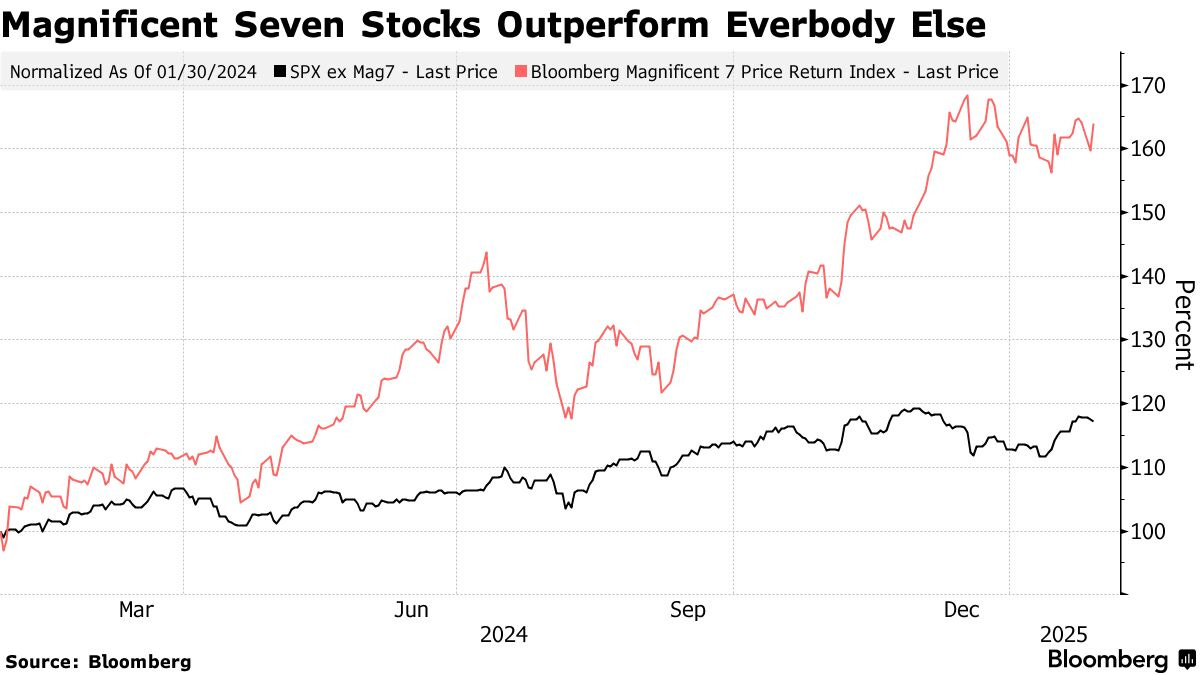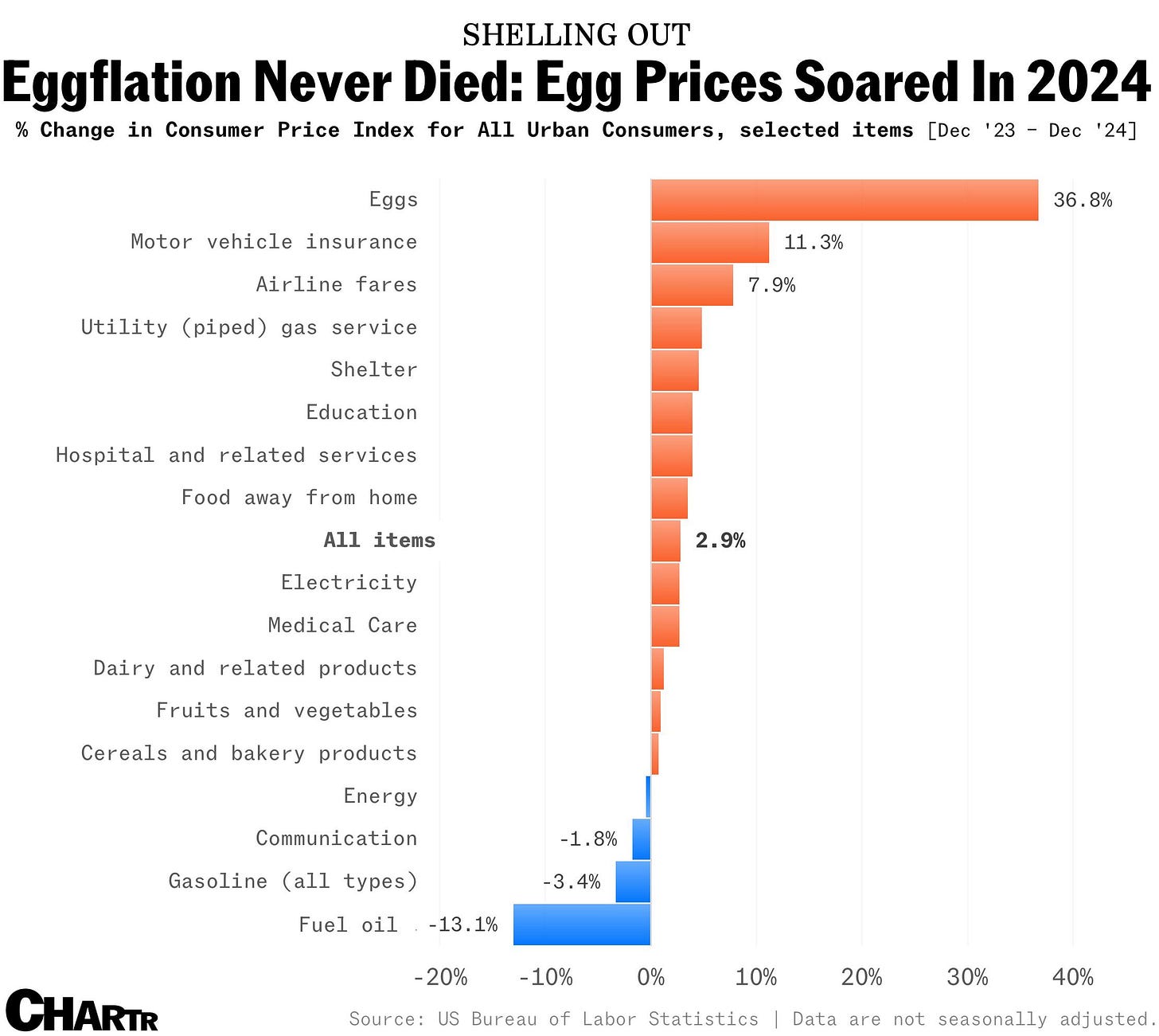Happy Wednesday all,
Tech stocks took a hit this week, with concerns growing over market concentration and a sharp selloff in the “Magnificent Seven.” Meanwhile, Microsoft and OpenAI are investigating whether Chinese AI startup DeepSeek improperly accessed OpenAI’s data, raising fresh concerns about the AI race.
On the cybersecurity front, Google revealed that hackers from China and Iran are using US AI tools to enhance their attacks, fueling debates over AI’s role in global security.
Plus, key headlines on airline mergers, record-breaking Super Bowl ad prices, and a troubling drop in US reading scores.
Enjoy this week’s Hump Days!
- Humphrey & Rickie
👀 Eye-Catching Headlines
Frontier Airlines proposes merging with fellow budget carrier Spirit — again (CNBC)
Super Bowl ads beckon up to $8 million apiece for Fox (CNBC)
Trump administration offering buyouts to nearly all federal workers (CNBC)
American Kids Are Getting Even Worse at Reading (WSJ)
OpenAI Is Probing Whether DeepSeek Used Its Models to Train New Chatbot (WSJ)
Chinese and Iranian Hackers Are Using US AI Products to Bolster Cyberattacks (WSJ)
ASML Surges Most Since 2020 as AI Investments Fuel Orders (BBG)
The Weekly Brief
Recent volatility in tech stocks once again has highlighted concerns over increasing market concentration, with the S&P 500’s performance increasingly reliant on a handful of megacap companies.
The "Magnificent Seven" tech giants, which drove over half of the index’s gains in 2024, faced sharp declines this week after a selloff triggered by developments linked to Chinese AI startup, DeepSeek. Nvidia alone wiped out $500 billion in market value.
The S&P 500’s leadership concentration now mirrors levels last seen during the dot-com bubble, with less than one-third of its components outperforming the benchmark over the past two years.
Goldman Sachs strategists led by Peter Oppenheimer warned this week that equity markets face risks from three overlapping forms of concentration: the dominance of US equities globally, the tech sector’s outsized influence, and rising single-stock weightings.
The current narrow market breadth we see in the market echoes the late 1990s, when similar conditions preceded a major correction. However, early 2025 has shown some signs of improving breadth, with about 75% of S&P 500 stocks rising year-to-date.
Microsoft Investigating If DeepSeek Improperly Used OpenAI Data
Microsoft and OpenAI are investigating potential unauthorized access to OpenAI’s data by individuals linked to Chinese AI startup DeepSeek, following reports of suspicious activity in late 2024.
Microsoft’s security team detected attempts to extract large volumes of data through the API, which developers license to integrate OpenAI’s models into their applications. While the exact intent remains unclear, the activity may have violated OpenAI’s terms of service or bypassed data access limits.
The probe coincides with DeepSeek’s release of its R1 model, an open-source AI system that rivals OpenAI’s capabilities at a fraction of the cost—$5.6 million versus billions spent by US firms—sparking a $1 trillion tech stock selloff earlier this week.
The R1 model’s disruptive market entry has raised questions about its development methods. US officials, including AI czar David Sacks, allege DeepSeek may have used “distillation” techniques to replicate OpenAI’s outputs, though concrete evidence remains undisclosed.
OpenAI acknowledged efforts by Chinese entities to mimic its models but emphasized that it had countermeasures to protect intellectual property.
Chinese/Iranian Hackers Are Using American AI to Enhance Cyberattacks
Google recently found that hackers from multiple nations, particularly China and Iran, are increasingly utilizing AI tools like Gemini to enhance their cyberattacks.
The research identified dozens of hacking groups across more than 20 countries using the chatbot primarily for code writing, vulnerability scanning, and target research.
While Iranian groups were the heaviest users, followed by Chinese groups, their usage was mainly focused on improving efficiency rather than developing revolutionary new hacking techniques. Both countries employed the AI for tasks such as reconnaissance, phishing campaign content generation, and studying specific hacking tactics.
This news comes amid growing concerns about AI's role in cybersecurity and international competition, especially following DeepSeek's emergence as a potential rival to Western AI models.
While current AI usage by hackers appears relatively modest, US officials and security experts worry about future implications, particularly given DeepSeek's open-source nature and low cost.
Google's chief legal officer, Kent Walker, emphasized the need for continued export controls on US chips and streamlined government procurement processes for AI services, warning that America's current lead in AI development may be temporary.







Great read! I enjoyed it very much, particularly the news about security and AI. Thank you!